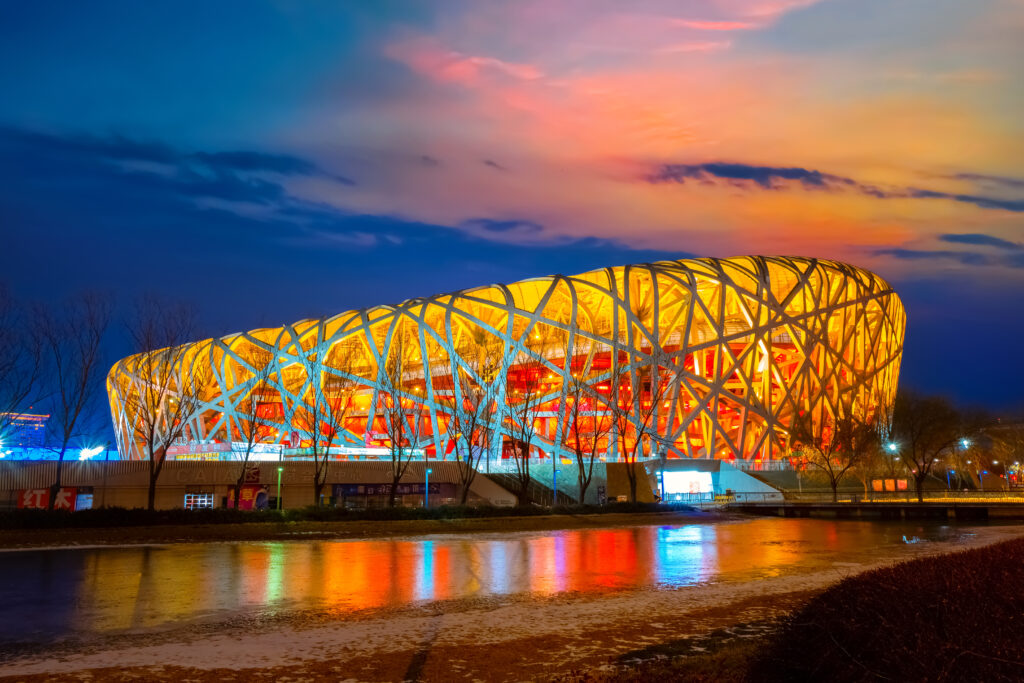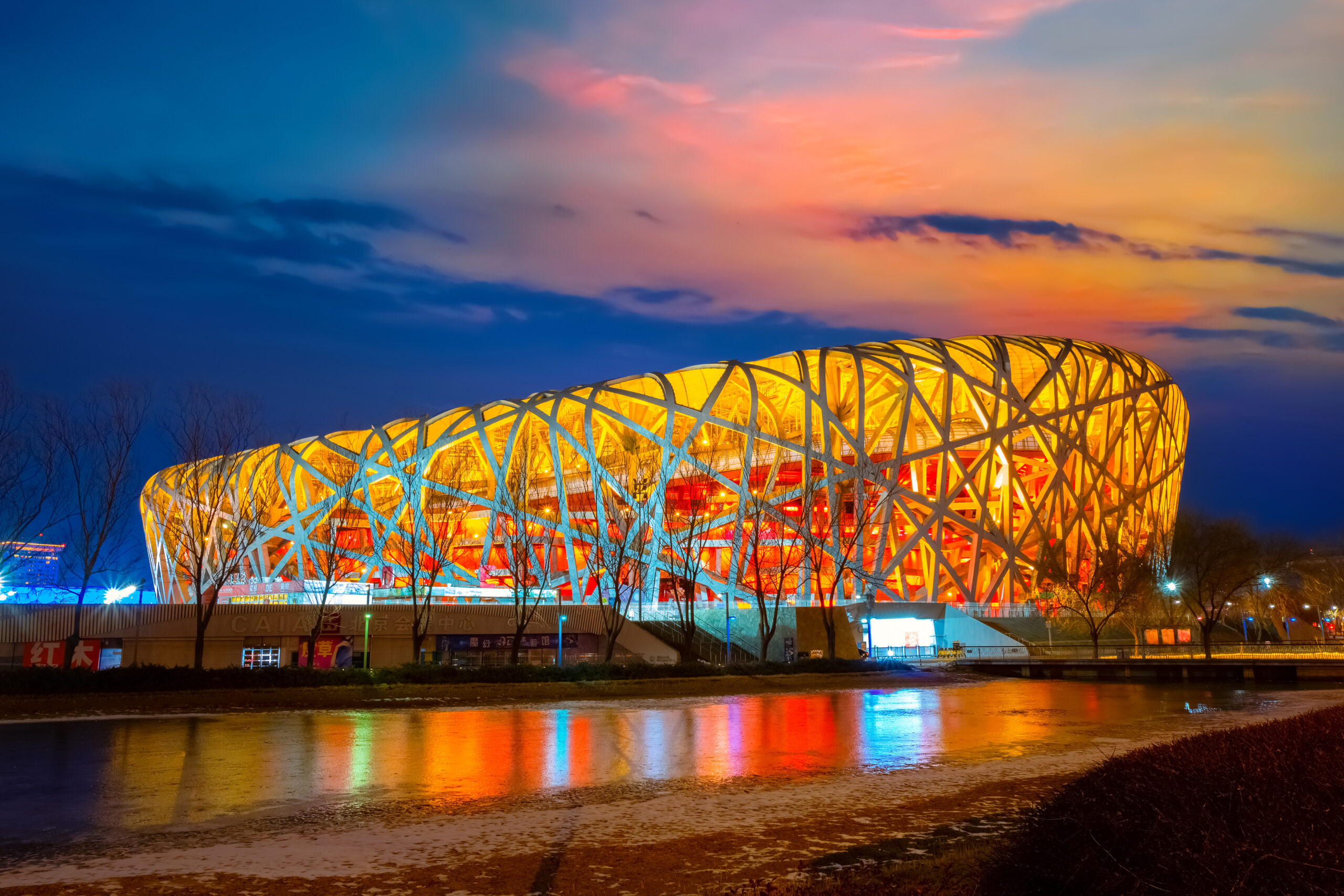Editor’s Note
For the rest of the world, China’s 2008 Summer Olympics—with its $40 billion budget, dramatic “Bird’s Nest” stadium, and the lavish spectacle of its opening ceremony—marked the ascension of a new economic superpower onto the modern stage. Since then, new generations of Chinese youth have grown up into a society constantly rippling with changes, inundated with globalization, technology, and consumerism.

Beijing, China – The national stadium built for the 2008 Summer Olympics & Paralympics
Today, the West views China with curiosity, suspicion, and a sense of enigma and threat. Chinese literature translated into English is still predominantly written by older authors from the period of World War II, Maoism, and the Cultural Revolution. This leaves the up-and-coming generation of Chinese artists, now dealing with wholly different lifestyles and a wholly new set of concerns, all too often neglected.
In proposing this special folio to The Common, I wanted to showcase perspectives from this younger generation, bringing the breadth and dynamism of their subject matter, style, and voice to an English-reading audience. I also wanted to combat the blind spot in publishing queer voices from China, and several of the pieces selected are from writers writing either explicitly or implicitly from a lens of non-heterosexuality—which is sometimes comparable to Western norms of LGBTQ+ identity and sometimes not.
In the poems, stories, and translations in this folio, we find writing which is interested in the stretchiness and flexibility of language across cultures and tongues. In experimental and hybrid pieces such as The CAO Collective’s “qiào bā ,” Jolie Zhilei Zhou’s “Der Knall,” or Cynthia Chen’s “When the TOEFL robot asked us…,” diasporic poets who have immigrated abroad use imagination and irreverence to push the boundaries of English, which is their second or even third language, resulting in pieces which are delightfully fresh and defamiliarized.
The stories and lyric pieces reveal a generation restless for art, creation, and newness, but mired down also with a deep sense of generational anxiety, pressure, lack of direction, and identity confusion, as in Ruonan Zheng’s essay on her time reporting on the Chinese underground for Vice China, Yun Qin Wang’s poem “the first rain,” Yunhan Fang’s story of a romance between two women in the aftermath of a devastating earthquake, and K-Yu Liu’s story of a dormitory of mentally ill teen girls sent to train at a competitive running facility.
Some of the pieces also deal with the disorientation caused by the super-rapid development of technology and communications, such as Yan An’s cheeky poem “Photo of Free Life in the E-Era.” Meanwhile, Jianan Qian’s short story “The American Scholar” cleverly turns the Western gaze on the “Eastern Other” back on its head by inhabiting the perspective of an American scholar who is shocked by the sex and kink scene in China.
Finally, traditional Chinese artifacts are reinvented and made modern with Shangyang Fang’s translations of Song Dynasty Ci poetry, which experiments, breaks from, and rewrites lines by poets written over a thousand years ago. Li Zhuang molds a story of China’s first and only female emperor, Wu Zetian, into a poetic lesbian fanfiction. And visual artist and writer JinJin Xu showcases an installation and collective poem taken from her research into nüshu (lit: “women’s script”), a writing system only for women denied access to education which has existed for centuries.
I selected the pieces for this folio hoping to break apart some of the preconceived notions Western readers may bring to their view on China. The writers collected here showcase the scrappiness and energy of a younger generation clamoring to be heard. I hope that you enjoy these poems and stories, which are unexpected, sharp, sometimes uncomfortable, and very often tender; above all, they powerfully evoke the restlessness, dreaminess, quickness, and intensity of youth.
—Cleo Qian, guest editor
This portfolio was edited by Cleo Qian. Cleo Qian is a queer writer and poet who is the author of the award-winning short story collection LET’S GO LET’S GO LET’S GO (Tin House, 2023). She is a 2024 MacDowell Fellow and a 2025 Notre Dame Storozynski Writing Fellow.
Contents
Fiction
“Paper Summer” by Yunhan Fang
“My Five-Thousand-Meter Years” by K-Yu Liu
“The American Scholar” by Jianan Qian
Poetry Feature I
“Fan Fiction” by Li Zhuang
“When the TOEFL robot asked us to ‘Describe the city you live in,’ the whole room started repeating that question as if casting an aimless spell” by Cynthia Chen
“Photo of Free Life in the E-Era” by Yan An, translated by Chen Du and Xisheng Chen
“Der Knall” by Jolie Zhilei Zhou
Poetry Feature II
“Departure” & “Visiting Lingyan Mountain” by Wu Wenying, translated by Shangyang Fang
“Return to Lin Gao at Night” by Su Shi, translated by Shangyang Fang
“the first rain” by Yun Qin Wang
“qiào bā: Community Poetry in Translation” by The CAO Collective
Nonfiction
“Memories of the Rise and Fall of Vice China, 2015-2022” by Ruonan Zheng
Art
“Against This Earth, We Knock” by JinJin Xu




